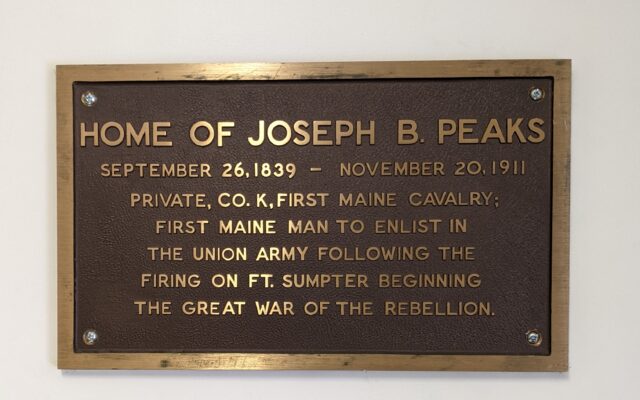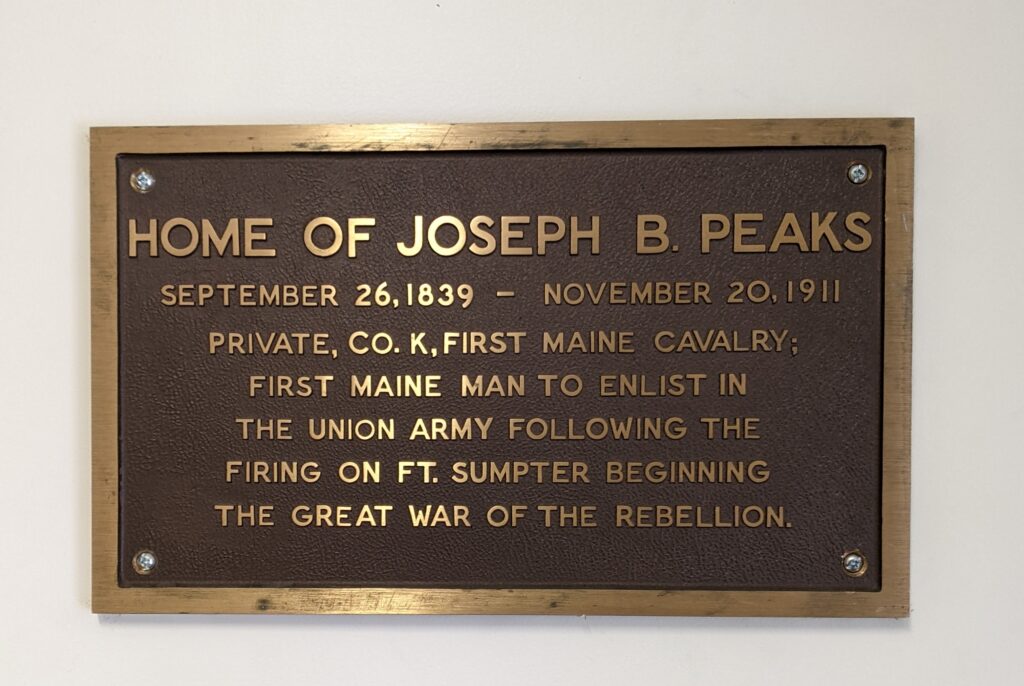
Civil War memorial plaque does not tell the whole story
By Eric Boothroyd
There is a bronze plaque in the entryway to the county commissioners’ chamber at the Peaks House in Dover-Foxcroft which states, “Home of Joseph B. Peaks, September 26, 1839 – November 20, 1911, Private, Co. K, First Maine Cavalry: First Maine Man to Enlist in the Union Army Following the Firing on Ft. Sumpter [sic] Beginning the Great War of the Rebellion.â€
When I first saw this plaque many years ago, it struck me as odd that the claim to be the first Maine man to enlist into the Civil War, which began in April 1861, was associated with service in a cavalry regiment that was not organized until autumn of 1861, and in which he did not enlist until Aug. 29, 1862. Further investigation revealed the rest of the story.
Joseph Bradford Peaks (also Peakes) was born in Charleston. He attended the local schools and the academies in Charleston and East Corinth in preparation for college, but in the early 1860s he moved to Lowell, Massachusetts, where his older brother, Thomas, worked in a lumber mill.
On April 12, 1861, Confederate batteries opened fire on Ft. Sumter in Charleston, South Carolina, marking the beginning of the American Civil War. The fort was surrendered on April 13th, and President Abrham Lincoln called for 75,000 troops to be raised by the states on the 15th. Peaks relates that on the afternoon of April 16th he encountered a Lt. Jones of the Lowell City Guards, a local militia unit, informing him that Ft. Sumter had been fired upon and that his company was to go to war at once. Peaks immediately enlisted into what became Co. D, 6th Regiment Massachusetts Volunteer Militia (also known as the “Minute Menâ€), for a three month enlistment. By the evening of the very next day, the regiment was assembled in Boston, fully equipped, and ready to embark by train to Washington, DC, just four days after the fall of Sumter!

MEMORIAL PLAQUE — The bronze plaque in the entryway to the county commissioners’ chamber at the Peaks House in Dover-Foxcroft for Joseph B. Peaks.
The rail route from Philadelphia to Washington passed through Baltimore, Maryland, where rail cars had to be pulled by horses across town from President Street Station to Camden Station because of an ordinance preventing steam rail lines through the city. Around noon on April 19th (Patriot’s Day) the 10-car train carrying the 6th Mass. Militia arrived in Baltimore amidst a mob of Southern sympathizers. The troops remained in their cars as they were ferried across town. The first seven cars were successfully transferred, but the last three were slowed by the mob which had grown to an estimated 8,000, hurling insults, bricks, and paving stones and brandishing pistols. Pvt. Peaks was in one of those cars.
The regiment’s colonel ordered his men to disembark with muskets loaded to commence a march to Camden Station. They were to hold their fire unless fired upon, until a front rank soldier was dropped by a civilian’s bullet. Then the mayhem of the “Baltimore Riots†began, in what is often called “the first bloodshed of the Civil War.â€
Peaks recalled that the colonel gave orders to shoot any man who was caught trying to uncouple the cars of the train, so when he saw a fellow in the act, Peaks promptly obeyed orders and “tumbled†the man down between the cars. This was the only man he remembered shooting in his Civil War service, but even then he was not sure if his shot killed the victim or whether his death was caused by the train running over him.
The troops managed to reach the station and continue their journey to Washington as one of the first trained and equipped regiments to arrive in defense of the Capitol, but at a cost of three soldiers killed, one mortally wounded, and 12 civilians dead, as well as many wounded on both sides.
Peaks served his three month enlistment period in the 6th Mass. and returned to Maine. He enlisted from Charleston into the First Maine Cavalry in August of 1862. He was wounded at the cavalry battle of Aldie, VA, on June 19, 1863 (where his colonel, Calvin Douty of Dover, was killed), was taken prisoner, and then managed to escape. He was discharged for disability on Nov. 1, 1863.
After the war, Joseph Peaks never did attend college, but he worked briefly as a traveling salesman and a clerk and owner of a dry goods business until he moved to Dover to read law with C. A. Everett. He was admitted to the bar in 1870 and had a prominent 41-year law career in Dover. In addition, he served as a state representative, state senator, state insurance commissioner, and chaired the Board of Railroad Commissioners. He also served as a colonel on the military staff of Gov. Seldon Connor for three years.
As for the claim of being the first Maine man to enlist, that may be hard to verify. Peaks was certainly one of the first, but technically his enlistment papers showed his residence as Lowell, Massachusetts. By that measure, Sumner Needham, the soldier who was mortally wounded by the mob, could also be a contender. He had resided in Lawrence, Massachusetts for 10 years and enlisted on the day before Peaks, but Needham was born in Norway, Maine, and moved to Lawrence from Bethel. Wouldn’t he have a stronger claim?
Regardless, Joseph B. Peaks was an early patriot for the Union cause and was defending the Capitol just one week after the firing on Ft. Sumter. In 1911, the last year of his life, Peaks was able to attend the 50th reunion of the 6th Mass. Regiment.
The Sons of Union Veterans and Daughters of Union Veterans will hold a joint memorial service in Dover Cemetery, on Vaughn Street in Dover-Foxcroft, at 11 a.m. on Saturday, May 27 to honor Sarah Elizabeth Palmer and Joseph B. Peaks.
Boothroyd is the current secretary-treasurer of Col. C. S. Douty Camp 11, Dover-Foxcroft, Sons of Union Veterans of the Civil War, and is a past department commander. More information on the SUVCW can be found at suvcwmaine.org.